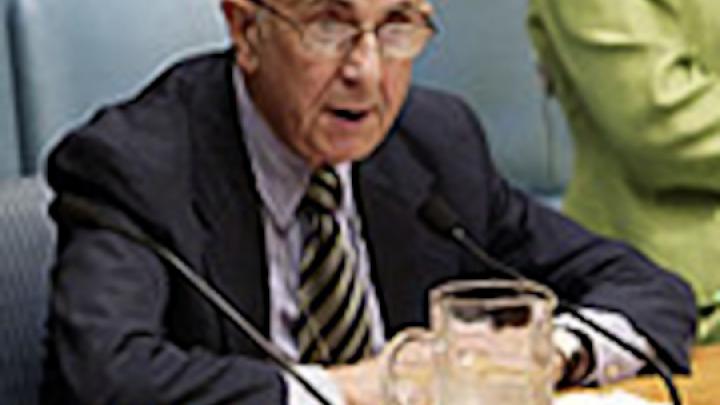President Meron presents first report on MICT’s work to the Security Council

President Theodor Meron today presented to the Security Council the first progress report on the work of the Mechanism for International Criminal Tribunals (Mechanism or MICT) since the launch of the Mechanism’s Arusha branch on 1 July 2012. The President reported that the Mechanism was “already deeply engaged in fulfilling its mandate”, and he assured the members of the Council of his commitment to making the Mechanism “a model institution”.
The President informed the Security Council that the Mechanism’s Rules of Procedure and Evidence had been adopted and that it had begun issuing orders and decisions in areas under its competence. He also pointed out that the Mechanism had taken over the support and protection of the nearly 3,000 protected witnesses who have testified in cases completed by the International Criminal Tribunal for Rwanda (ICTR). In addition, President Meron informed the Security Council that, as mandated, the Mechanism: was handling issues related to the enforcement of sentences handed down by the ICTR; had assumed responsibility for monitoring ICTR cases transferred to national jurisdictions; and had begun providing assistance to States in their domestic investigations and prosecutions of individuals charged in relation to the genocide in Rwanda.
President Meron reported that preparations were well under way for the launch of the Hague branch of the Mechanism, which will commence operations on 1 July 2013. He observed that it is already anticipated that any appeals in the cases of Šešelj, Karadžić, Hadžić, and Mladić at the International Criminal Tribunal for the former Yugoslavia (ICTY) will come before the Mechanism, as will any appeals in the ICTR case of Ngirabatware.
The President emphasized that, while the Mechanism’s judicial activities will involve handling appeals cases inherited from the ICTR and ICTY, the Mechanism will be prepared to conduct trials of Messrs. Félicien Kabuga, Augustin Bizimana, and Protais Mpiranya, the three fugitives indicted by the ICTR whose cases have not been referred to national jurisdictions. The President urged the Security Council to assist the Mechanism in this respect: “The arrest and trial of these three fugitives is a top priority for the Mechanism.”
The President underscored how honoured he is to have been appointed President of the Mechanism: “In overseeing the creation and operations of the Mechanism, I (…) feel a particular responsibility to demonstrate to the international community that fairness and efficiency are not mutually exclusive concepts. Making international criminal justice sustainable in the long run depends in great part upon demonstrating that it can be an efficient, effective, and affordable proposition for the international community.”
In concluding, President Meron thanked the members of the Security Council for their support of the Mechanism and urged them to reflect on the Mechanism’s potential: “[T]he Mechanism has the potential to build upon the achievements of its predecessors by creating a model institution that is effective and efficient and represents the international community’s strong commitment to the fight against impunity. I look forward to working with you to turn this potential into a reality.”
Established by the Security Council of the United Nations, the Mechanism is mandated to carry out a number of essential functions of the ICTY and the ICTR. The President will submit reports every six months to the Security Council on the progress of the work of the Mechanism.